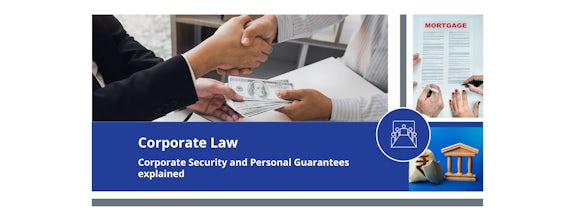In the UK, several common security documents are used in various financial transactions, especially in the context of lending and borrowing to companies. The can include guarantees from other companies in the borrower’s group or personal guarantees from directors/shareholders. Here are some of the most common security documents:
- Mortgage Deed (England) or Standard Security (Scotland): This document is used in real estate transactions. It grants a lender a legal interest in the property being purchased, which serves as collateral for the loan. If the borrower defaults on the loan, the lender can potentially take possession of the property through a legal process.
- Debenture (England): A debenture is a document that grants a lender a charge or security interest over the assets of a company. It often covers all of the company’s assets and is used in corporate lending transactions. In the event of default, the lender can take control of and sell these assets to recover their debt.
- Personal Guarantee: As mentioned earlier, a personal guarantee is a commitment by an individual to personally repay a company’s debt in case of default. It’s a common form of security, especially when a company doesn’t have substantial assets to offer as collateral.
- Floating Charge: A floating charge is a type of security interest over a company’s assets, which allows the company to continue using and dealing with these assets in the ordinary course of business. It becomes a fixed charge upon the occurrence of certain events. In England a floating charge shall usually be part of a Debenture. In Scotland it shall be a stand alone document.
- Pledge Agreement: This document is used when specific assets like shares or securities are pledged as collateral for a loan. In case of default, the lender can take ownership of the pledged assets.
- Assignment/assignation of Life Insurance Policy: In certain cases, life insurance policies can be assigned to a lender as security for a loan. If the borrower defaults, the lender can claim the policy’s proceeds to cover the debt.
- Charge Over Bank Accounts: Lenders may take a charge over a company’s bank accounts, which allows them to access the funds in these accounts to repay the debt in the event of default.
- Corporate Guarantee: A guarantee is a commitment by a third party to pay a debt if the borrower defaults. These are separate documents often used in conjunction with other security arrangement where other companies in the borrower’s group guarantee to the lender performance of the borrower’s obligations.
- Personal Guarantee: These are often used in corporate security arrangements. A personal guarantee is a legal commitment by an individual (usually a director or shareholder of a company) to personally repay a debt or fulfill a financial obligation of the company in case the company defaults. When an individual provides a personal guarantee, they become personally liable for the company’s debt. This means their personal assets can be used to repay the debt if the company cannot. The extent of personal liability can also vary. Some guarantees are limited to a specific amount or time frame, while others can be unlimited, making individuals personally responsible for all of the company’s debts.
These security documents are crucial in protecting the interests of lenders and ensuring the repayment of loans. Accordingly, lenders frequently won’t lend without some security protections being included. The specific document used depends on the nature of the transaction and the assets or guarantees available to secure the loan. It is crucial therefore before borrowing from a lender that borrowers and guarantors seek legal advice to fully understand their obligations and potential risks.
We have advised many borrowers on funding and can assist you in ensuring that the lending package is appropriate to you and your business. To discuss further please contact Craig Darling at cdarling@gilsongray.co.uk.








